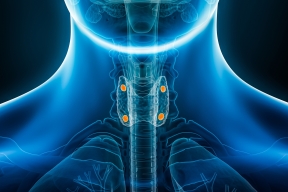Understanding Parathyroid Disease
Medically Reviewed by Hugh L. Willcox, III, MD, FACS
Dr. Hugh Willcox, McLeod General Surgeon with Pee Dee Surgical Group, explains parathyroid disease and how it could affect the body.
When it comes to managing your health, understanding the lesser-known parts of your body can make a big difference. You may not have ever thought about, or even heard of, your parathyroid glands, but these small glands are vital players in maintaining your body’s all-important calcium balance.
What Is Parathyroid Disease?
Parathyroid disease occurs when one or more of the four small parathyroid glands—located near your thyroid in the neck—become overactive. These glands are responsible for regulating calcium levels in your blood. The most common type of parathyroid disease is hyperparathyroidism. This occurs when one or more parathyroid glands become enlarged or overactive, leading to excessive production of parathyroid hormone (PTH) and potentially high calcium levels in the blood.
There is a classic medical phrase to describe the symptoms of high calcium levels: stones, bones, groans, and psychiatric overtones. These include:
- Stones: Kidney stones are often the first and most noticeable symptom.
- Bones: Vague, persistent bone pain, especially in the arms and legs.
- Groans: Abdominal discomfort or pain that is hard to pinpoint.
- Psychiatric Overtones: Mood changes such as anxiety or irritability.
When several of these symptoms occur together, it is a strong indicator that something may be wrong with the parathyroid glands.
Diagnosing Parathyroid Disease
Diagnosis begins with blood tests to measure the calcium and parathyroid hormone (PTH) levels, as well as imaging tests, such as an ultrasound, to locate any tumors or enlarged glands.
Treatment Options
While there are medications that can reduce calcium levels, in most cases surgery is the best option. The procedure, known as a minimally invasive parathyroidectomy, involves removing the problematic gland through a small neck incision—usually just 2 to 3 centimeters.
Recovery and Aftercare
Most patients stay in the hospital overnight following surgery, primarily to monitor calcium levels. While high calcium is harmful, so is a sudden drop in calcium after removing an overactive gland.
Can You Prevent Parathyroid Disease?
Unfortunately, there is not much you can do to prevent parathyroid disease—it is not something influenced by lifestyle factors like diet or exercise and often comes down to genetics. However, early detection is crucial. Staying on top of routine checkups and speaking with your primary care provider if you experience symptoms like kidney stones, bone pain, or unexplained mood changes, can lessen the long-term issues you may experience.
-
McLEOD REGIONAL MEDICAL CENTER FLORENCE
843-777-2000 -
McLEOD DARLINGTON
843-777-1100 -
McLEOD DILLON
843-774-4111 -
McLEOD LORIS
843-716-7000 -
McLEOD SEACOAST
843-390-8100 -
McLEOD CHERAW
843-537-7881 -
McLEOD CLARENDON
803-433-3000



-
McLEOD REGIONAL MEDICAL CENTER FLORENCE
843-777-2000 -
McLEOD DARLINGTON
843-777-1100 -
McLEOD DILLON
843-774-4111 -
McLEOD LORIS
843-716-7000 -
McLEOD SEACOAST
843-390-8100 -
McLEOD CHERAW
843-537-7881 -
McLEOD CLARENDON
803-433-3000
 Find a Doctor
Find a Doctor  Locations
Locations  Services
Services 